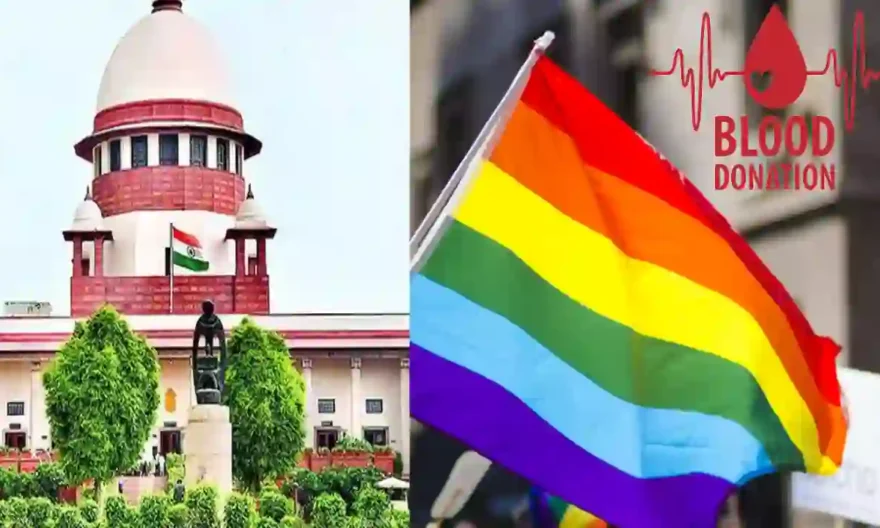
The Union Ministry of Health and Family Welfare has recently filed a preliminary affidavit in a petition challenging the blood donor guidelines, which prohibit Transgender people, gay men, female sex workers, and others from donating blood.
The National Blood Transfusion Council (NBTC, a body comprised of medical and scientific experts) has stated that the determination of the population group that is to be barred from being blood donors is based on scientific evidence. At the threshold, the affidavit argues that the issues raised in the petition are within the purview of the executive and must be considered from the standpoint of public health rather than individual rights.
The Public Interest Litigation (PIL) filed by Thangjam Santa Singh, a member of the Transgender community, through Advocate Anindita Pujari, challenges the “Guideline on Blood Donor Selection and Blood Donor Referral, 2017” issued in October 2017 by the National Blood Transfusion Council (NBTC) and the National Aids Control Organization (NACO) under the aegis of the Central Health Ministry. Clauses 12 and 51 of the aforementioned guidelines classify transgender people, gay men, and female sex workers as high-risk HIV/AIDS patients and prohibit them from donating blood.
The Ministry’s affidavit, now, submits that there is substantial evidence to demonstrate that ‘transgender persons, men having sex with men and female sex workers are at risk for HIV, Hepatitis B or C infections’.
It claims that the petitioners have essentially challenged the inclusion of transgender people, gay men, and female sex workers in the ‘at risk’ category, rather than the exclusion of individuals who are at risk for HIV, Hepatitis B, or C infections.
According to the affidavit, the Blood Transfusion System is a critical component of India’s healthcare system, and it is a major public health responsibility to ensure the safety, quality, clinical effectiveness, and availability of blood. It is noted that the integrity of India’s Blood Transfusion System must be strengthened in order to instill trust in people who rely entirely on it. It also claims that obtaining blood from high-risk groups contradicts the National Blood Policy, which emphasises the importance of a safe donor pool.
The petition argued that excluding the aforementioned class of people solely based on their gender identities/sexual orientation is not only unreasonable, but also unscientific.
“All blood units collected from donors are tested for infectious diseases including Hepatitis B, Hepatitis C, and HIV/AIDS, and thus permanently excluding them from donating blood and categorising them as high-risk only on the basis of their gender identity and sexual orientation is a violation of their right to be treated equally as other blood donors,” the petition stated.
“The prohibition of transgender people, men having sex with men, and female sex workers is based on assumptions based on negative stereotypes, which amounts to discrimination under Articles 14 and 15 of the Constitution, and they are denied equal dignity under Article 14 as they are deemed less worthy and subordinate in social participation and healthcare,” it continued.
It claimed that blood donation guidelines have been updated around the world to no longer make deferrals based on gender identities, instead prescribing a 3 month or 45-day deferral from the last high-risk sexual contact.
In this context, the plea stated,” Blood donor guidelines must be based on an individualised system for all donors, not on perceived risk or identities. The current contested Guidelines are stigmatising because they are not based on how HIV transmission actually works, nor on the actual risks involved in specific activities, but only on the identities of donors, such as whether they are transgender, gay, bisexual, or female sex workers.”
Finally, it urged that, in light of the COVID-19 crisis, where blood transfusions are more needed than ever for emergency and elective surgeries and treatments, members of the transgender community rely on the generosity of their family and community members to meet the demands for getting life-saving blood to those affected by the pandemic.
The Ministry responded to the petitioner’s claim that testing blood for infectious diseases such as Hepatitis B, Hepatitis C, and HIV/AIDS already reduces the risk of transfusion-transmitted infections. According to the affidavit, there is a residential infection window period during which the infection is not detectable even if the individual from whom blood is drawn is infected.
It claims that the petitioner’s submission is unsustainable due to testing technology limitations. It is noted that the majority of blood banks in India use non-Nucleic Acid Testing technology, and where NAT is available, the 10-33-day window period still exists.
Given the limited technology available in India, the affidavit contends that the petitioner’s submission that, instead of blanket exclusion, a deferral period for transgender people, gay men, and female sex workers can be considered is also unsustainable.
“Because of the aforementioned limitations, it is submitted that even the most advanced testing technologies will never be completely proof, and it is most critical to limit the pool of blood donors to individuals who present the least risk of Transfusion Transmitted Infections based on available scientific evidence.”
According to the affidavit, transgender people, gay men, and female sex workers continue to be marginalised groups, and stigma prevents them from seeking timely treatment.
It further added, “There is also a higher risk of transmission of new emerging diseases from these groups, as seen recently among MSM in the case of monkey pox.”




